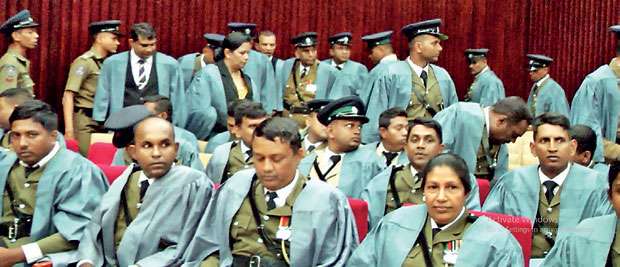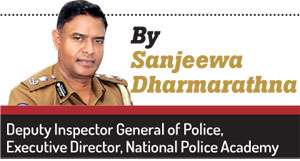21 Jan 2019 - {{hitsCtrl.values.hits}}

The path of Sri Lanka Police which can be traced back to 152 years of pride has encountered many twists and turns. Especially, the modern-day police officer has to face a great number of responsibilities which has gone beyond the aims and objectives entrusted to police during the time it was established as a formal police service on 03 September 1865 under the leadership of George William R. Campbell.
Various acts of crime such as cybercrimes, human trafficking, offences related to dangerous narcotics, organized crimes, financial crimes can be observed among those.
In such a context, having just the basic training given to a new police recruit is not adequate at all for them to face the above challenges.
In such a situation, the secondary training of a police officer is a sine qua non and a timely need. Therefore, it is essential to examine the development and evolution of the higher training in Police Service.
While doing so, our minds go back to the day, 16.11.1905 in the first half of the 19th century, during the term of office of Inspector General of Police Mr C. C. Langdon.
That day marks the commencement of the first Police Training College inside a two-storeyed building on Prince Street, Colombo Fort. Later on, it has gone through various stages and currently, the basic training is given through 07 sub-units established in different parts of the country, under Sri Lanka Police Academy, Kalutara.
This offers the basic training to the 03 categories of police officers namely, Police Constables, Sub Inspectors of Police and Assistant Superintendents of Police, who come for the basic training. In 1947, the Francis J. Soutz Commission was appointed with the intention of improving the modern aims and objectives and the quality of Police Service along with the idea of identifying the due changes which should be made in Police Training.
It has been pointed out through the report of this commission that police officers should be patient and courteous and that the training they receive should be given with the aim of imparting a vast knowledge on socio-cultural aspects, sharpening their rational thinking while building both physical as well as mental strength.
Under such circumstances, the 1970 Basnayake Commission was appointed to make recommendations and to look into how the training a police officer needs to undergo should be like. They have pointed out giving examples that the training of the police officers had not been performed in a methodical or organized way at the time. They had further indicated the need for establishing a Police Investigation and Higher Training Institute conforming to a high standard in order to identify the training needs and methods to develop knowledge and skills of officers who were in active police service.
Taking the recommendation of this Basnayake Commission into account, Police Higher Training Institute was established on 27.11.1978 in Colombo Fort. Mr Adhikari S. B. W. De Silva has performed duties as the first director of that establishment.
At the initial stage, traditional diploma certificate courses in the preliminary investigation of crime, prosecution, public relations and practical policing methods had been conducted. Later on, the Police Training Institute was relocated to the 05th Floor of the Secretariat Building and afterwards relocated to Aththidiya, Dehiwala, where the proposed University of Police Criminal Justice will be erected. The Police Higher Training Institute had functioned until 2009.
Especially this period was a time when Sri Lanka Police had to shoulder one of the greatest tasks of building harmony between the North and South with the end of 30 year-long flames of war. Under these circumstances, promoting professionalism and developing the duty capacity of the Police officers was a timely need. Taking that condition into account, when the former Inspector General of Police, Mr H.A.J.S.K. Wickramarathna was holding office in 07.01.2009, Sri Lanka Police Academy was established by part (ii) of the Police Gazette No. 1583. Then on 01.04.2010, the Police Academy was established at the address; Thimbirigaskatuwa, Negombo.
During its inception, steps have been taken to improve professional skills of Police officers by introducing 12 courses including a one- year- higher diploma course on Police Science along with certificate courses in criminal investigation, forensic medicine, traffic management and community policing.
The date, 21st November 2011 has been marked as a significant day as the higher training of Sri Lanka Police was elevated to a higher position both locally as well as internationally on that day. Sri Lanka Police Training College which had been functioning under the said name was re-established as National Police Academy by the Act No. 44 of 2011 of Sri Lanka Democratic Socialist Republic of Sri Lanka.
During this period, Mr N. K. Illangakoon was holding office as the Inspector General of Police. The objectives of establishing this academy have been identified as the development of skills and professional knowledge of police officers and other law enforcement officers selected for training in such a way that will offer them opportunities for career progression.
The National Police Academy has achieved a very special vision under the auspices and guidance of the Management Board and the Academic Board. Especially, the National Police Academy has taken many measures to develop facilities and to improve their health in addition to imparting knowledge and skills to police officers who enter the institution. Especially, a five-year development plan is being implemented under the main plan of modernizing the National Police Academy together with the Faculty of Architecture of the University of Moratuwa. On completion, it will consist of a fully-equipped male and female hostel buildings that provide accommodation for about two hundred and fifty diploma students, a library building with all the facilities, an indoor stadium with all the facilities, a ground with a pavilion and a swimming pool. As the Executive Director, I wish to express my humble sense of satisfaction on being able to achieve rapid progress in the physical and academic fields of National Police Academy with the blessings of the Management Board of National Police Academy and Inspector General of Police, Mr Pujith Jayasundara.
The four-storeyed administrative building which consists of lecture halls, offices and a conference hall for which the foundation stone was laid, marking that as a memorable day, on 23.02.2018, by present Inspector General of Police, Mr PujithJayasundara is scheduled to be declared open at the end of this year.
Many measures have been taken at present to offer the advanced training that is being offered to Sri Lankan Police officers not only to the law enforcement officers of other institutions but also to the police officers of foreign countries.
Subsequently, a number of Memorandums of Understanding have been signed nationally and internationally. Apart from the MOUs exchanged with the Republic of Maldives on 22. 01.2014 and with the Republic of Korea on 07.10.2016 and with Vietnam on 12.12.2018, MOUs that Sri Lanka Police have exchanged with the University of Sri Jayewardenepura in 2016 and with the University of Kelaniya in 2017 are also of great significance. Higher Diploma in‘Criminal Investigation which has been introduced with the affiliation to the University of Kelaniya is being conducted successfully and for the first time in police history, all the required measures have been taken to commence the proposed Bachelor’s Degree Programme in Police Science, with the affiliation to the University of Kelaniya, in the near future. Apart from the aforesaid Memorandums of Understanding, some programmes are being conducted with organizations such as Interpol (The International Criminal Police Organization), Royal Canadian Mounted Police and countries such as Scotland, Australia for exchanging knowledge and developing the quality of the training in the Sri Lanka Police.
30 Nov 2024 2 hours ago
30 Nov 2024 5 hours ago
30 Nov 2024 6 hours ago
29 Nov 2024 29 Nov 2024
29 Nov 2024 29 Nov 2024